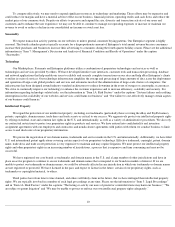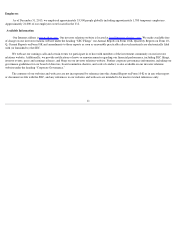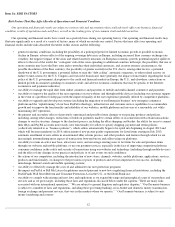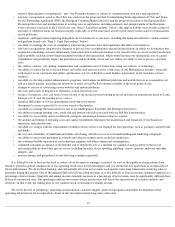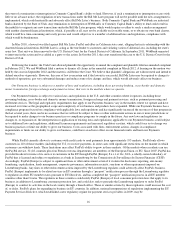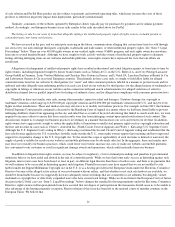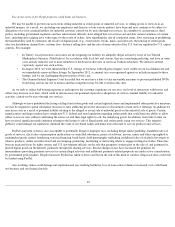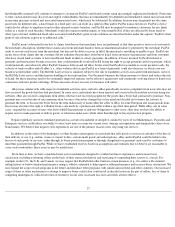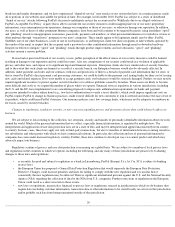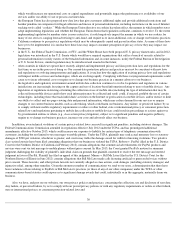eBay 2013 Annual Report Download - page 22
Download and view the complete annual report
Please find page 22 of the 2013 eBay annual report below. You can navigate through the pages in the report by either clicking on the pages listed below, or by using the keyword search tool below to find specific information within the annual report.
rights and cancellation rights to U.S. consumers who make international remittance payments. These remittance transfer rule requirements could
increase our costs of processing international payments and adversely affect our business. In January 2014, the CFPB proposed a regulation that
would allow it to supervise all companies, including PayPal, that provide more than one million international money transfers per year. Under
the proposal, CFPB examiners would be able to examine PayPal for compliance with the remittance transfer rule.
On August 7, 2013 and January 13, 2014, we received Civil Investigative Demands (CIDs) from the CFPB requesting that we provide
testimony, produce documents and provide information relating primarily to the acquisition, management, and operation of the Bill Me Later
business, including online credit products and services, advertising, loan origination, customer acquisition, servicing, debt collection, and
complaints handling practices. We are cooperating with the CFPB in connection with the CIDs.
Changes to payment card networks or bank fees, rules, or practices could harm our Payments business.
PayPal does not directly access payment card networks, such as Visa and MasterCard, which enable PayPal's acceptance of credit cards
and debit cards (including some types of prepaid cards). As a result, PayPal must rely on banks or other payment processors to process
transactions, and must pay fees for this service. From time to time, payment card networks have increased, and may increase in the future, the
interchange fees and assessments that they charge for each transaction using one of their cards. For example, MasterCard has recently announced
a new Staged Digital Wallet Operator Annual Network Access Fee which would apply to many of PayPal's transactions if the buyer uses a
MasterCard to fund their payment. The fee for 2013 was collected from PayPal in June 2013. PayPal's payment card processors have the right to
pass any increases in interchange fees and assessments on to PayPal as well as increase their own fees for processing. Changes in interchange
fees and assessments could increase PayPal's operating costs and reduce its profit margins. In addition, in some jurisdictions, governments have
required Visa and MasterCard to reduce interchange fees, or have opened investigations as to whether Visa or MasterCard's interchange fees and
practices violate antitrust law. In the U.S., the Dodd-Frank Act enacted in 2010 authorizes the Federal Reserve Board to regulate debit card
interchange rates and debit card network exclusivity provisions, and in June 2011, the Federal Reserve Board issued a final rule capping debit
card interchange fees at significantly lower rates than Visa or MasterCard previously charged. Any material reduction in credit or debit card
interchange rates in the U.S. or other markets could jeopardize PayPal's competitive position against traditional credit and debit card processors,
although it would also lower PayPal's costs. While the regulations adopted by the Federal Reserve Board in June 2011 do not treat PayPal as a
“payment card network,” future changes to those regulations or to PayPal's business could potentially cause PayPal to be treated as a payment
card network, which could subject PayPal to additional regulation and require PayPal to change its business practices, which could reduce
PayPal's revenue and adversely affect PayPal's business.
PayPal is required by its processors to comply with payment card network operating rules, and PayPal has agreed to reimburse its
processors for any fines they are assessed by payment card networks as a result of any rule violations by PayPal or PayPal's customers. The
payment card networks set and interpret the card rules. Payment card networks have from time to time alleged that various aspects of PayPal's
business model violate these operating rules. Such allegations have recently been made more aggressively, and if not resolved, could result in
material fines and penalties or require changes in PayPal's business that may be costly, make it less attractive to customers or even require
PayPal to cease certain operations. The payment card networks could adopt new operating rules or interpret or re-interpret existing rules that
PayPal or its processors might find difficult or even impossible to follow, or costly to implement. As a result, PayPal could lose its ability to give
customers the option of using payment cards to fund their payments, or could lose its ability to give customers the choice of currency in which
they would like their card to be charged, which would reduce PayPal's revenues from cross-border trade. If PayPal were unable to accept
payment cards, its business would be seriously damaged. In addition, the velocity of trade on eBay and websites operated by Enterprise clients
that accept PayPal as a form of payment could decrease and our business would further suffer.
PayPal is also required to comply with payment card networks' special operating rules for payment service providers to merchants. PayPal
and its payment card processors have implemented specific business processes for merchant customers in order to comply with these rules, but
any failure to comply could result in fines, the amount of which would be within the payment card networks' discretion. PayPal also could be
subject to fines from payment card networks if it fails to detect that merchants are engaging in activities that are illegal or that are considered
“high risk,” primarily the sale of certain types of digital content. For “high risk” merchants, PayPal must either prevent such merchants from
using PayPal or register such merchants with payment card networks and conduct additional monitoring with respect to such merchants. PayPal
has incurred fines from its payment card processors relating to PayPal's failure to detect the use of its service by illegal or “high risk” merchants.
The amount of these fines has not been material, but any additional fines in the future would likely be for larger amounts, could become material
and could result in a termination of PayPal's ability to accept payment cards or changes in PayPal's process for registering new customers, which
would significantly damage PayPal's business. PayPal's new retail point-
20


